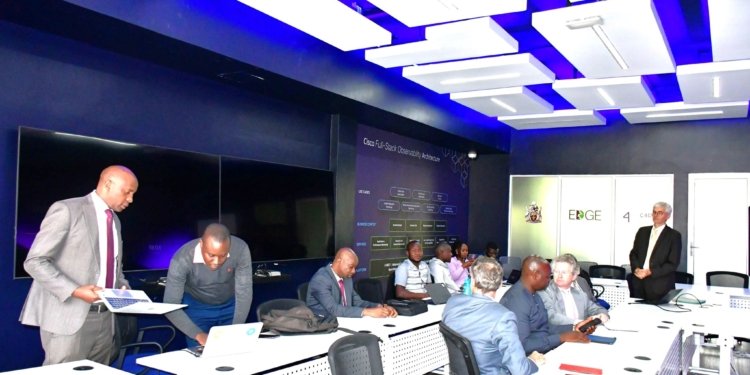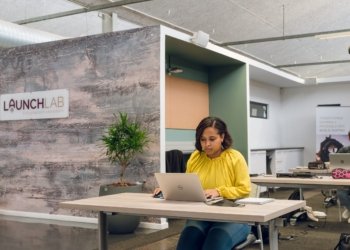What if a single lab could transform promising ideas into real-world solutions that tackle major societal issues? This is the powerful question driving the work at a leading hub for technological advancement in East Africa.
The Computing for Development Lab, or C4DLab, stands as a flagship project aligned with Kenya’s Vision 2030. It was officially launched to bridge the gap between academic research and practical application. The initiative focuses on creating a dynamic ecosystem for growth.
This facility is more than just a workspace. It is a vibrant community where researchers, students, and entrepreneurs come together. Their goal is to develop cutting-edge technology that drives meaningful progress.
Currently, the lab supports a dozen startups through intensive mentorship. These teams work on turning their prototypes into sustainable businesses. The focus is on creating market-ready companies that can compete on a global scale.
By examining this model, we can see how academic institutions are becoming central players in economic development. The lab’s activities are strategically linked to national policies, ensuring its impact is both significant and far-reaching.
Key Takeaways
- The C4DLab is a key part of Kenya’s Vision 2030, aiming to drive national development through technology.
- It serves as a central hub that connects academic research with real-world business creation.
- The lab provides crucial support, including mentorship, to help technology startups succeed.
- Its work is strategically aligned with national policies to maximize its positive impact.
- This model demonstrates how universities can effectively foster sustainable innovation ecosystems.
- The initiative highlights the importance of collaboration between different groups to solve big challenges.
Innovative Research and Technological Solutions
Creating meaningful technological change demands more than just brilliant ideas. It requires a structured ecosystem that nurtures development from concept to implementation.
Mission and Vision of Technological Innovation
The lab’s mission centers on generating and sharing valuable knowledge. This approach brings together diverse thinkers to tackle pressing challenges.
There is a strong focus on moving beyond theoretical research. The vision prioritizes practical applications that improve lives and support sustainable development.
Cutting-Edge Research Projects and Initiatives
Researchers explore multiple technology domains with creative approaches. Mobile solutions, data analytics, and urban innovations receive particular attention.
Strategic partnerships with government and industry ensure alignment with national policy. This collaboration strengthens the entire innovation community.
Exploring University of Nairobi – C4DLab Initiatives
Effective technology incubation combines strategic guidance with practical resources to transform promising ideas into commercial successes. The lab’s structured approach addresses the critical gap between academic training and real-world entrepreneurship.
Technology Incubation and Startup Mentorship
The incubation programme forms the core of this initiative’s operational model. It provides comprehensive services designed to nurture early-stage ventures.
Currently, twelve startups receive personalized mentorship from experienced professionals. This support covers technical development and business strategy refinement.
The goal is to build sustainable companies that create employment opportunities. These ventures address local challenges while contributing to economic growth.
Strategic Partnerships and Government Support
Government backing has been essential for the lab’s operations. Substantial investments in ICT infrastructure create an enabling environment for innovation.
The steering committee actively explores diverse funding mechanisms. This ensures the programme can maintain its comprehensive support services.
Strategic alignment with national development frameworks positions the initiative as a valuable national asset. It contributes directly to broader economic and technological objectives.
Community Engagement and Innovation Week
The most impactful technological solutions often emerge from understanding and addressing immediate community needs. This approach forms the foundation of meaningful engagement efforts that connect academic work with real-world challenges.
Campus Innovations: The Bike Sharing Program
A recent bike sharing initiative demonstrates practical community engagement. The programme allows users to borrow bicycles across campus, addressing urban mobility challenges.
The vice chancellor praised this simple yet effective project. It helps students and staff move more efficiently while promoting healthier transportation options.
Alumni Support and Industry Collaborations
Strong connections with graduates and corporate partners strengthen the innovation ecosystem. Alumni provide valuable mentorship and networking opportunities for current students.
Industry collaborations ensure that projects align with market needs. These partnerships help transform academic ideas into viable services and products.
Fostering Local Content Capacity for Future Growth
Developing home-grown technology solutions represents a key strategic priority. Building local capacity ensures innovations address specific regional challenges.
This approach supports broader economic development goals. It creates opportunities for people to develop solutions that serve their communities effectively.
Conclusion
Academic innovation hubs represent a transformative approach to bridging research and real-world impact. The model demonstrates how institutional support can nurture promising startups from concept to commercial success.
This approach maintains a clear focus on practical applications that serve local community needs. The lab has shown that with proper mentorship, early-stage ventures can grow into sustainable businesses.
Strategic partnerships with government and industry create robust support networks. This ecosystem fosters an environment where creativity flourishes and innovation addresses real challenges.
The success of this university-based model offers valuable lessons for other regions. Innovation hubs across South Africa and the continent can learn from this comprehensive approach to supporting startups.
Looking ahead, continued focus on building local capacity will strengthen technological self-reliance. This ensures solutions remain relevant to specific regional contexts across South Africa and beyond.
FAQ
What is the main goal of the C4DLab?
The primary goal is to drive technological innovation and entrepreneurship. It focuses on creating solutions that address local and global challenges. The lab provides a space for creativity, research, and turning ideas into real-world applications.
How does the lab support startups and new companies?
It offers a comprehensive incubation programme. This includes mentorship, access to funding networks, and workspace. The support helps early-stage ventures develop their technology and business models for market success.
What role does the Nairobi Innovation Week play?
This event is a major platform for showcasing creativity. It connects students, alumni, and industry partners. The week highlights new projects, facilitates knowledge sharing, and builds a stronger innovation community.
Can you describe a specific project managed by the lab?
A notable initiative is the campus bike sharing program. This project provides a sustainable transportation solution for students. It demonstrates how simple technology can improve daily life and foster a culture of practical problem-solving.
How does the initiative collaborate with government and other partners?
Strategic partnerships are key to its success. The lab works closely with government bodies and private sector companies. These collaborations help shape supportive policy and provide crucial resources for development.
What opportunities are available for alumni and the local community?
Alumni can engage through mentorship, networking events, and supporting new startups. The lab also focuses on building local content capacity, ensuring that community members gain valuable skills in technology and data.






